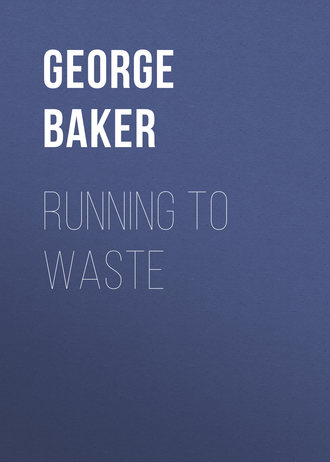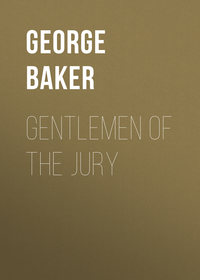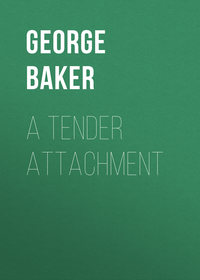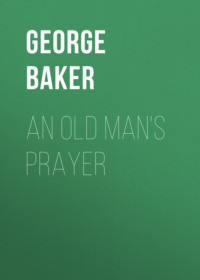 полная версия
полная версияRunning To Waste
“Master Thompson, if you please, I was very rude to you yesterday. I want to beg your pardon before all the scholars.”
“Very well, Miss Becky; you were somewhat rude; but this free confession amply atones for it. You are forgiven.”
“I want all the scholars to know, if you please, that after school, when I was told to take my place upon the platform, I jumped out of the window.”
Harry bit his lip. This was just what he didn’t want the scholars to know; and they never would have known how he had been outwitted, but for Becky’s confession. She was altogether too penitent.
“That will do, Miss Becky. You have said quite enough. I shall expect better conduct from you in the future.”
“I mean to try, sir.”
Becky returned to her seat. She did try hard that day; and not only that day, but every day, found her trying, and succeeding, too. She diligently applied herself to the studies assigned her, watched her conduct carefully, and in a very short time Harry Thompson had reason to be proud of his pupil. She gave Teddy a helping hand, also. She was pained to hear the laugh when Teddy blundered; so every night at home Teddy was carefully tutored by his sister for the next day’s task; and in a short time he, too, accomplished wonders.
As soon as the brain was trained to systematized labor, Becky’s sharp eyes traced the difference in her attire and that of the girls about her; and very soon improvement was noticed in this. Mrs. Thompson, whose visits to the brown house were now of daily occurrence, taught her to sew. Material was readily found among the stock of presents the sailor husband had been accustomed to bring his wife, and which had never been made up; and thus Becky was as neat and well dressed a girl as there was in the school. She made quick progress with her studies. In one branch she excelled all – that of drawing. Harry had introduced this as a pleasant study, with no idea that Becky had such a genius for it as she rapidly displayed.
Mr. Drinkwater continued ill all the winter, and Harry kept the school, by his orders; for, contrary to his expectations, Captain Thompson did not come into the school. The shrewd proprietor evidently discovered the trick to bring about a reconciliation, and, with his usual obstinacy, defeated the well laid plan. And so, autumn gave place to winter, and the snow lay heavily on the ground. Winter, in turn, gave place to spring, with all its opening beauties; and school was over.
Harry Thompson stood upon the steps of the school-house, the door locked behind him for the last time, the key in his hand. His scholars had gone; up and down the road he could hear their merry voices, as they wended their ways homeward. But one was left to keep him company – Becky Sleeper. She stood beside him, anxiously watching his troubled face; for the master was looking across the road at the home of his childhood, where he could not now enter. He was bitterly disappointed in his labors; they had not brought about the reconciliation for which he had plotted, and which, for his mother’s sake, he had so longed for. He turned, with a sigh, to Becky.
“Well, little one, school is over.”
“Yes, Harry. It’s been a pleasant time for me. How can I thank you for having been so kind to me, for having taught me so much, and being such a dear, kind friend?”
“Yes, I have been able to do you some good, Becky. My labor has not been fruitless, after all.”
Fruitless! No. One look at the thoughtful face beside him, one glance at the trim figure, might convince him of that. Six months ago a hoiden, to-day a woman; bright, young, beautiful, still; but strong, energetic, persevering, rapidly unfolding the intellectual graces of true womanhood.
He was fond of his pupil; and to her he was a hero – always had been; but for the last six months they had been constantly in each other’s company. Out of school, many of the old familiar ways had been revived. They had ridden, sailed, rowed, even indulged in an occasional game of cricket. At her home he was a constant visitor, that being the established rendezvous for meeting his mother; and mother and son had diligently wrought – quietly, but earnestly – a great change in her life. She knew it, and blessed them for it. These two were very dear to each other, and, without knowing it, were passing beyond the boundaries of friendship into the perplexing maze of love.
“Harry,” said Becky, suddenly, “where does all the money come from?”
“Money, Becky! What money?”
“The money that gets us all we have at home. Mother’s went long ago; and yet we are always well supplied with food and clothing. Does it come from your father?”
“I think it does, Becky. My angel mother possesses a key which unlocks all his treasures; and I suspect that some of them fly across the bridge to your home.”
“I thought so. It isn’t right. Is there not some way in which I could earn money?”
“Well, I don’t know of any. Stay. You might blow the bellows for Fox, the blacksmith, or get employment in the shipyard.”
“O, stop. That’s not what I want. Couldn’t I work in one of the mills?”
“Yes, I suppose you could; but I wouldn’t, at least until after we’ve had a consultation with my angel mother.”
“Then let’s have one, quick. I’m determined to earn money some way; and if you don’t find me something better I will blow the bellows for Mr. Fox.”
“Well, I’ll come over to-night, and we’ll have a grand council of war. Good by, Becky.”
“Good by, Harry.”
He turned up the road, and she stood and watched him as he stepped briskly along, swinging the key in his hand, and whistling merrily.
“He’s just splendid! O, if I was only a man, to follow him into the world! For this life will not content him long. He’s restless now, eager to be at work among men. And he’ll go, too. And, O, dear! how lonesome it will be without him!”
Even then Becky felt a lonesome shadow gliding into her heart with its oppressive weight, felt the tears gathering in her eyes. Then, when he was still in sight! How would it be when he should be far, far away?
Yet she stood and watched as he descended the hill, till he was out of sight; longer still, her eyes fixed upon the spot from which he had vanished, her thoughts shaping themselves into queer notions of the future, in girlhood’s flattering mirror of romance, building bright pictures of renown for him, – her hero, – in which she bore no part.
From this sudden romantic attack she was aroused by the appearance of another figure in the place on which her eyes were fixed. Slowly toiling up the hill came a girl, pale-featured, poorly-clad, deformed, and crippled. With the aid of a crutch she stumped along the path until she reached the school-house; then, with a pleasant nod to Becky, and a sigh of relief, she seated herself upon the steps.
Becky returned the nod, and seated herself by the side of the cripple.
“You seem to have a pretty hard time of it.”
“Do I?” said the cripple, smiling. “Well, I suppose to you, who have two feet to run about on, it does seem hard. But it’s the best I can do, the best I ever could do; and so I don’t mind it a bit.”
“You don’t mean to say that you like being a cripple,” said Becky, in astonishment. “I never could be contented in that way – never!”
“No, I don’t think I like it; but I cannot help it. It must always be so. It’s hip trouble. I only try to make the best of it. The hardest to bear are the hard, grinding pains that come sometimes. O, they are terrible! But they come and go; and after they’re gone I’m real comfortable till – the next.”
“Well, you’re a brave girl, any way,” said Becky. “What’s your name, please?”
“Why, don’t you know Jenny York? I thought everybody knew me. What’s yours?”
“Becky Sleeper.”
“What! the tomboy?”
A dark shadow passed across the face of Becky.
“I was the tomboy, Jenny; but I’ve outgrown that name. I think I’m something a little nearer what a girl of my age should be now.”
“I beg your pardon for speaking so, Becky. I’ve never met you before; but I’ve always heard of you and your – your – ”
“Capers, Jenny. Don’t be afraid. I don’t mind it a bit. Thank goodness, I’ve outgrown all that folly. But tell me, are you Silly York’s sister?”
“Yes. She’s number one, and I’m number two; then there’s Johnny, three, and four and five. They’re little tots, and don’t count for much yet. Silly works for Mrs. Thompson, and I work at the mill.”
“You work! At what mill?”
“The paper mill, sorting rags. It’s profitable business, too. Some weeks I make five or six dollars.”
What a strange meeting! A little cripple earning six dollars a week, and a great, strong, healthy girl, who never earned a cent. Becky could scarcely believe her ears.
“Why, Jenny York, you’re worth a dozen girls like me. I never earned a cent in my life. I wish I could, though.”
“It’s easy enough. Mr. Small wants some help; he told me so to-day. The work is not very clean; there’s plenty of dust to get down your throat, and up your nose, and into your ears. But it never gets into my eyes thick enough to prevent my seeing the wages every Saturday night.”
Jenny York laughed merrily, making it evident that the dust had no effect on her good humor.
“There, I guess I’ve had a good rest. I must be going.”
“Let me go with you,” said Becky, springing up, and assisting Jenny to regain her feet.
“O, thank you! That will be nice. I can put my arm about your waist, if you’ll let me, and you can shoulder the crutch, if you like, and ’twill be a pleasant change for me.”
Warm-hearted Becky quickly adjusted herself to the requirements of her companion, and they started off down the road.
“Do you walk up and down every day, Jenny?”
“O, no. Almost always somebody comes along and gives me a ride. Everybody is very kind to me, and I get along famously.”
Ah, Jenny, if everybody had your cheerful spirit, how much better and brighter the world would become! how pleasantly we should all get along! The hard, grinding times come to all, in different shapes, to be rightly borne in patience; but between the past and the coming are long reaches of level life which the sunshine of a contented spirit can make glad and happy.
That long walk opened a fresh path in the new life to Becky. For two years Jenny York had worked at the mill. She gave her companion a full description of her duties, and eagerly pressed her to come and try her luck. They parted at the door of Mr. York’s house, sworn friends. Becky, refusing an invitation to enter, remembering her charity visit, gave Jenny her promise that the next day should find her at the mill.
So homeward tripped Becky, thanking her lucky stars for this providential meeting, thinking how oddly it had come about that just at the right moment a weak, crippled girl had been able to point out to her the road to independence.
The “council of war” that night deliberated long and earnestly on the question which Becky laid before that body. Harry opposed, Mrs. Thompson hesitated, Becky was resolute.
“I hate to oppose you, Harry, who have been so good to me. But I can earn money there; and it’s high time I did something for the support of the family.”
She had taken the precaution to win Aunt Hulda and her mother to her side before submitting her plan to the others. Aunt Hulda, whose admiration for Becky sometimes was unbounded, had been first consulted. This mark of confidence had won all that remained of Aunt Hulda’s heart, and she readily acquiesced, as she would have done had Becky proposed to shingle the church. The mother had read in the sparkling eyes of her daughter, now so very dear to her, the earnest desire to work and earn, and could not, if she would, disappoint her. Thus thrice-armed in a just cause, Becky met her councillors, and bore off the victory at last.
With these stipulations: she should give just the time daily which had been occupied by her school duties to rag-picking – no more. She should perform her household labors as usual, and be ready at other times for out-door exercise at the will and pleasure of Harry Thompson. His consent could be gained on no other terms. Mrs. Thompson was doubtful of the influences which might be brought to bear upon Becky at the mill, yet could not but admire the spirit she displayed. She hesitated on Becky’s account a while, then smilingly gave her vote in favor of Becky, and the field was won.
The next morning found her at the mill equipped for dusty labor. Mr. Small received her kindly, made a satisfactory bargain with her, and she at once entered upon her duties.
The paper mill was composed of three buildings; the main section, comprising the business office, the machine-room, the pulp-vats, and the bleaching-tubs, was built of bricks. At right angles with this structure, and attached to it, was a flat-roofed wooden building. In the lower story of this were stored rags in bags; from this room they were hoisted to the second story, where they were sorted, then taken to the main building to be bleached. At the end of this building was a low, slant-roofed stable. In the sorting-room from ten to a dozen females were usually employed; and to this section of the paper mill Becky was assigned.
To no pleasant work did Becky set her hands; in no very pleasant companionship did she find herself. With the exception of Jenny York, the “girls” were middle aged and old women, loud-tongued, and very apt to be quarrelsome. At first Becky tried to make friends with all of them; but, finding her overtures met with rudeness, she desisted from further attempts, and drew the closer to the little cripple.
As time passed on, and she grew familiar with her labor, stronger grew her friendship for Jenny. These two made a corner of their own, a little removed from the Babel of tongues. Jenny, rejoicing in the companionship of one so near her age, was always bright and happy. Becky, catching the inspiration of her cheerful spirit, overflowed with mirth and humor, and oft-repeated stories of tomboy adventures made them both merry over their work.
But Becky never lost sight of her independence. She worked gaily, but she worked with a will; and the sight of her wages when Saturday came was a reward of merit dearly prized. Steadily she worked through the hot months of summer, until she could count ninety dollars in her strong-box; and then a sad disaster befell the mill.
The machinery of a paper mill seldom stops, night or day, save for repairs. It was in the month of September that it was necessary to stop for the repair of a broken wheel. The sorting-room, however, was kept in operation.
At twelve o’clock the “girls” repaired to their homes for dinner – all but Jenny York. Occasionally Becky staid to keep her company, but not often, the stipulations with the council requiring her to be punctual to her meals at home. Certainly Jenny fared all the better for this, for Becky’s return always added something nice to her plain fare.
But one day Jenny had a fierce attack of her grinding pains, and all the forenoon she lay upon a couch of bags, and when dinner time came, spite of her wishes, Becky would not leave her. They were alone; Jenny, just recovering, was faint and ghostly white; Becky, bending over her, was bathing her temples, when, suddenly, outside, the cry of “Fire!” was raised. Becky sprang to her feet, to find the room thickening with smoke, coming up through the chinks in the floor. A too common accident in paper mills had occurred. A bag of cotton waste had burst into flames, and the store-room beneath was a furnace of fire. Her first thought was – no thought at all. The instinct of self-preservation took her into the machine-room very quick, and then she thought of Jenny. She ran back to the terrified girl, crying, —
“Don’t be frightened, Jenny. The mill’s on fire; but I’ll save you.”
She stooped and lifted Jenny in her arms. All the “waste” of her early life served her well now. Exercise had made that small frame tough and muscular, and she easily bore Jenny towards the door. But suddenly the iron doors between the two buildings were closed with a crash. Some crazy operative, thinking only of the danger to the main building, had taken this precaution, without looking into the room. Becky dropped her burden, and flew to the doors. She screamed for help; she beat the iron with her fists in vain. Then she ran to the windows on the sides; there were none at the end. But the thick, black smoke, rolling up outside, obscured the light. No escape there; they were walled in on every side. The smoke in the room was so thick it was with difficulty they could breathe.
No escape? Yes, one. Becky cast her eyes aloft. In the centre of the roof was a scuttle, ten feet above her. Lying along the side of the room was a ladder. Becky sprang for it. It was very heavy; but desperation nerved her arms, and it was raised.
All this time Jenny lay upon the floor, watching with wishful eyes the movements of Becky. O, if she only had a little strength now! Becky came to her side, and raised her once more in her arms.
“Now clasp me close, and we’ll soon reach the roof, and be out of this stifling smoke, any way.”
With her heavy burden she toiled up the ladder, rested a moment at the top, then threw up the scuttle, and reached the roof. There she laid Jenny down and ran to the edge. Right and left the smoke was rising in dense volumes; but at the farther end all was clear, and beneath it was the steep roof of the stable. There was her chance for escape. She could drop easily; it was but ten feet. But Jenny! The poor girl would scarce escape without injury. Only a moment she pondered, then ran back to the scuttle, and descended the ladder, at the risk of her life. Near the iron doors the flames were shooting up through the floor, and dancing on the wall. The smoke was stifling. She caught up several empty bags, and quickly regained her place upon the roof.
“Quick, Jenny, quick! Help me to tear these bags to pieces. We must have a rope.”
They tore the bags apart, divided them, with the aid of their scissors, into long, narrow strips; then Becky’s nimble fingers twisted them together.
“Now, Jenny, I’m going to lower you to the shed; and then we’re safe.”
She fastened the improvised rope about Jenny’s waist, and bore her to the edge of the roof. She then passed the rope around the chimney.
“Once more, Jenny. Slide over the roof, and hold on to the rope.”
The rope slid through Becky’s hands, and Jenny was upon the roof below. Then the brave girl, casting loose the trusty cord, advanced to the edge of the roof, and, supporting herself a moment by her hands, dropped beside her friend. None too soon; for, while she clung there, up through the scuttle appeared the flaming head of the advancing column of fire.
It was still ten feet from the stable to the ground, and no time to be lost.
“Slide down the roof, Jenny, and drop again. I’ll hold you; never fear.”
She stretched herself flat upon the roof, with the rope in her hands. Jenny slid down, and dropped as directed. But now a new danger to Becky arose: the cord had become entangled in her dress; and, as Jenny descended, she found herself being dragged down the roof. But she held all the tighter to the rope, fearing the shock to Jenny, should she fall, more than the danger of being herself plunged headlong from the roof. Faster and faster they went; she was nearing the edge; she must go over. No. Suddenly the cord slacked. Jenny had touched the ground. She dropped the cord, clutched the gutter with all her strength, her body swung round, and she dropped to the ground, very ungracefully, but unhurt.
“O, Becky, you’ve saved my life! Can I ever repay you.”
Jenny lay upon the ground, with clasped hands and streaming eyes. Becky stood by her side, looking ruefully at the burning building. No more work there.
“Yes, Jenny, I believe I’ve saved both our lives. But there’s one thing I forgot; and it’s just like me. Your crutch! I might have saved that too.”
Not quite a thoughtful, earnest woman yet, Becky; but this day the climbing frolics of the tomboy days have enabled you to glorify humanity with its proudest triumph – an heroic act!
CHAPTER IX.
TEDDY SLEEPER DINES OUT
Just before the breaking out of the fire in the paper mill Teddy Sleeper, sat on the door step awaiting the return of his sister. He was particularly uneasy on this occasion, having had a long spell of fishing with no luck, “not even a bite” and was very impatient at the delay in obtaining a “bite” at home, it being the invariable rule there, to wait for Becky. Teddy under the wise rule of his sister had lost much of his gaukiness and rough speech but had lost none of his rotundity of form and cool, phlegmatic disposition. With him everything was taken as a matter of course. Nothing ever surprised him into expressions of wonder, and seldom did he lose his temper. The sole disturber of his peace was hunger – the foe that has successfully assailed the good disposition of many wise and great men. Under its attacks Teddy grew restless and disorderly. He was in a fair way to do something rash, when his keen eye discovered smoke rolling up over the paper mill, and the cry of “Fire! fire! fire!” faintly reached his ears. He rolled off the step, took a long look in the direction of the smoke, then started down the hill. Reaching the church, he saw Phil Hague standing before the captain’s house, shading his eyes and looking up the road. People were hurrying toward the fire.
“Phil, Phil, it’s the paper mill!”
“Is that so? Bedad, its foine kindlings they have there for a blaze.”
“Come on. Let’s get out the ingine.”
“What for, I dunno?” said Phil, scratching his head.
“To put out the fire. Here, Jackson, the ingine. Hold on, Smith, help run her up. Come on, Phil.”
Teddy run to the engine house, followed by Phil, and Smith and Jackson, who were on their way to the fire.
The engine was kept next door to the church. It was a heavy, old-fashioned affair, not much larger than a good-sized wash-tub, had not been moved for years, and it was very doubtful if it could be made to work. Of this Teddy took no thought. There was a fire, and the first thing to be done was to have it on the spot. So they pulled it out and started down the hill as fast as they could run. Not being experienced firemen, they did not use any “hold-back” measures, and the consequence was, half way down the hill they found the “ingine” close upon their heels, and themselves in danger of being crushed. With one accord they dropped the rope, and sprang to the sides of the road. “Cataract” – this was the name by which the extinguisher was known – being deserted by its leaders, went thundering down the hill and tipped over at the bottom.
“By my sowl,” said Phil Hague, “that’s a quare way of putting out a fire. The contrary divil’s laid down for a nap.”
“Come on, it ain’t hurt; let’s set it up and lug it up the hill,” said Teddy hurrying to the prostrate Cataract.
They managed to get it upon its wheels again, tugged up the hill with their heavy burden, and at last reached the fire. A hose was laid and the engine manned, but the rusty machine refused to work. All this time Teddy had been sweating and hurrying to get it in operation. It was a sore disappointment to him after all his trouble.
Mark Small came along at that moment.
“It’s no use, boys, there’s been no washers on them pumps this five years.”
There was a laugh from the crowd and Teddy turned away with a very red face.
“The best engine in the world would be of no use now. She’s got to burn,” said Small, looking at his buildings, now enveloped in flames. “Much obliged to you, Teddy, all the same. Tell you what you can do. There’s little York frightened most to death. Becky got her out just in time. Just you take my team and get her home. That’s a good fellow.”
Teddy followed the direction of Small’s pointing finger, and saw Jenny York crouching on the ground beside Becky. In a moment he was beside the girls.
“Hello, girls, had a narrow squeak of it. Say, Becky, Small says you got her out. Is that so?”
“Yes, I did, Teddy. Ain’t you glad?” said Becky.
“Glad; you bet I am. Bully for you. Hurrah for Becky Sleeper.”
The crowd took up the shout, and Becky received an ovation. Just then Small drove up in his wagon.
“Come, Teddy, get the girls home, quick.”
He leaped from his seat and took Jenny in his arms and placed her in the wagon.









